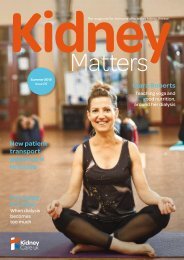Kidney Matters - Issue 11 Winter 2020
Kidney Matters is our free quarterly magazine for everyone affected by kidney disease. This issue includes part one in our series on available treatment for type 1 diabetes and kidney failure, discovers how art can help pass the time during dialysis, answers questions about chronic kidney disease and the menopause, and features an article on your voice to all four governments: shielding during Covid-19, Brexit and the proposed organ donation law change in Northern Ireland. As well as this we have a recipe for deliciously festive Mince Pies by our Kidney Kitchen Patissier, Lizzie Morey.
Kidney Matters is our free quarterly magazine for everyone affected by kidney disease. This issue includes part one in our series on available treatment for type 1 diabetes and kidney failure, discovers how art can help pass the time during dialysis, answers questions about chronic kidney disease and the menopause, and features an article on your voice to all four governments: shielding during Covid-19, Brexit and the proposed organ donation law change in Northern Ireland.
As well as this we have a recipe for deliciously festive Mince Pies by our Kidney Kitchen Patissier, Lizzie Morey.
You also want an ePaper? Increase the reach of your titles
YUMPU automatically turns print PDFs into web optimized ePapers that Google loves.
11
When am I post-menopausal?
You are described as post-menopausal 12 months
after your last period—on average at age 52 in the
UK. Unlike the ‘male hormone’ testosterone, which
decreases gradually with age—even in women!—
oestradiol (sometimes spelled estradiol), the most
important type of oestrogen, falls rapidly in postmenopausal
women (Figure below). This usually
means fewer menopausal symptoms, but there are
long-term health implications.
Oestrogen is thought to protect the heart and
blood vessels. This protection is gradually lost after
menopause, increasing the risk of heart attack and
stroke.
Oestrogen is also essential for bone health in women.
As we get older, we lose more bone than we form,
resulting a gradual loss of bone mass. Once this
reaches a certain point, osteoporosis (‘porous bone’)
develops. Bone loss occurs without symptoms, so you
may only know you have osteoporosis when a minor
injury results in a fracture.
Older women are known to be at risk of osteoporosis.
But low oestrogen levels in younger women—for
example, due to periods stopping on dialysis—can
severely affect your bones.
Do I need tests to diagnose menopause?
It is not always straightforward to confirm when your
menopause happened. This applies especially if you
were started on hormone replacement therapy (HRT)
for perimenopausal symptoms or your heavy periods
were treated with Mirena (a hormonal device inserted
into your womb).
Paula advises: “It is not usually crucial to pinpoint the
time of menopause. Blood tests are not recommended
if you are aged over 45, since management is based on
how you feel and your symptoms. If you are aged under
45 and have symptoms, including if your periods stop
while you are on dialysis, your ovaries may not be working
properly. Your FSH levels should be checked and you
should be managed in the same way as any other woman
with early menopause/premature ovarian insufficiency.
“Guidelines recommend that you should start HRT
and continue until around age 51, the natural age of
menopause. You can stop HRT if your periods restart
after a successful transplant—and this can happen
surprisingly quickly—but then you need to think about
contraception. I strongly recommend every woman
to use contraception until she is aged 55, because
occasionally an older woman gets pregnant, especially
after starting on HRT. The early 50s is a bad time for an
unintended pregnancy, especially if you have a longterm
condition like CKD, and it is also high risk for the
baby,” she adds.
Can I take HRT?
“Menopause is a major life event, and every woman
needs a holistic assessment that is centred around her
personal circumstances, needs and preferences, as
well as her medical history. For a woman with CKD, this
is likely to mean multidisciplinary assessment involving
a menopause specialist, her kidney doctor and her
renal pharmacist,” advises Paula.
Lifestyle changes can be helpful in managing some
menopausal symptoms and will improve your general
health (See Table 2 on next page). Otherwise, HRT is
first-choice medical treatment for relief of symptoms
because it replaces oestrogen lost during the
menopause transition.
Figure: How sex
hormones change
with age in women
and men
Issue 11 | Winter 2020

















